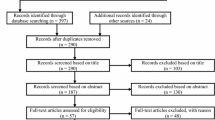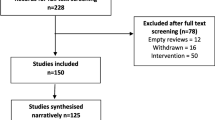Abstract
Purpose
Many cancer survivors experience problems with persisting symptoms such as pain, fatigue, anxiety and depression post-treatment. Self-management interventions are recommended for cancer patients as they can help individuals identify and manage these continuing symptoms. This systematic review examines the type, content and impact of self-management interventions for cancer survivors on health outcomes such as activity participation, self-efficacy, quality of life and symptom management.
Methods
This was a systematic review of the English language scientific literature searched for randomised controlled trials (RCT), systematic reviews and meta-analyses of self-management programmes conducted with cancer survivors. Six databases were systematically searched.
Results
Initial searches yielded 2633 citations. Following screening and a risk of bias assessment, six studies were included in the final review. Heterogeneity of the interventions precluded meta-analysis. Three studies reported significant differences between groups in a number of areas including fatigue, physical functioning, distress and self-efficacy at their first follow-up assessment. These studies included two psychosocial interventions and one exercise and diet intervention. Not all findings were sustained across studies at follow-up assessment.
Conclusion
It is not possible to draw definitive conclusions as to the impact the different types of self-management programme had on cancer survivors. The sustainability of the interventions reviewed was poor, suggesting that cancer survivors require interventions that can be applied into their daily activities.


Similar content being viewed by others
References
National Cancer Registry Ireland (NCRI) (2016) Cancer in Ireland 1994–2014. National Council Registry Ireland, Cork
National Cancer Registry Ireland (NCRI) (2013) Cancer in Ireland: annual report of the National Cancer Registry Ireland. National Cancer Registry, Cork
Centers for Disease Control and Prevention (CDC) & Lance Armstrong Foundation (LAF) (2004) A national action plan for cancer survivorship: advancing public health strategies. CDC, Atlanta, GA
Hewitt M, Greenfield S, Stovall E (2005) From cancer patient to cancer survivors: lost in transition. National Academies Press, Washington, DC
Shneerson C, Taskila T, Holder R, Greenfield S, Tolosa I, Damery S, Gale N (2015) Patterns of self-management practices undertaken by cancer survivors: variations in demographic factors. Eur J Cancer Care 24(5):683–694. https://doi.org/10.1111/ecc.12252
Foster C, Fenlon D (2011) Recovery and self-management support following primary cancer treatment. Br J Cancer 105(S1):S21–S28. https://doi.org/10.1038/bjc.2011.419
Naidoo J, Hayes E, Teo MY, Horgan A, Calvert P, O’Connor M (2013) An Irish breast cancer survivorship study: are we meeting our patient’s needs? Ir Med J 106(9):262,264–262,266
Barlow J, Wright C, Sheasby J, Turner A, Hainsworth J (2002) Self-management approaches for people with chronic conditions: a review. Patient Educ Couns 48(2):177–187. https://doi.org/10.1016/S0738-3991(02)00032-0
McCorkle R, Ercolano E, Lazenby M, Green DS, Schilling LS, Lorig K, Wagner EH (2011) Self-management: enabling and empowering patients living with cancer as a chronic illness. CA Cancer J Clin 61(1):50–62
Lorig KR, Holman HR (2003) Self-management education: history, definition, outcomes and mechanisms. Ann Behav Med 26(1):1–7. https://doi.org/10.1207/S15324796ABM2601_01
Purcell A, Fleming J, Burmeister B, Bennett S, Haines T (2011) Is education an effective management strategy for reducing cancer-related fatigue? Support Care Cancer 19(9):1429–1439. https://doi.org/10.1007/s00520-010-0970-2
Schjolberg TKR, Dodd M, Henriksen N, Asplund K, Smastuen MC, Rustoen T (2014) Effects of an educational intervention for managing fatigue in women with early stage breast cancer. Eur J Oncol Nurs 18(3):286–294. https://doi.org/10.1016/j.ejon.2014.01.008
Cheville AL, Shen T, Chang M, Basford JR (2013) Appropriateness of the treatment of fatigued patients with stage IV cancer. Support Care Cancer 21(1):229–233. https://doi.org/10.1007/s00520-012-1515-7
Meneses-Echávez JF, González-Jiménez E, Ramírez-Vélez R (2015) Effects of supervised exercise on cancer-related fatigue in breast cancer survivors: a systematic review and meta-analysis. BMC Cancer 15(1):77. https://doi.org/10.1186/s12885-015-1069-4
Gao WJ, Yuan CR (2011) Self-management programme for cancer patients: a literature review. Int Nurs Rev 58(3):288–295. https://doi.org/10.1111/j.1466-7657.2011.00907.x
Hammer MJ, Ercolano EA, Wright F, Dickson VV, Chyun D, Melkus GD (2015) Self-management for adult patients with cancer an integrative review: an integrative review. Cancer Nurs 38(2):E10–E26. https://doi.org/10.1097/NCC.0000000000000122
Moher D, Liberati A, Tetzlaff J, Altman DG, The PRISMA Group (2009) Preferred reporting items for systematic reviews and meta-analyses: the PRISMA statement. Ann Intern Med 151(4):264–269
Higgins JPT, Green S (Eds) (2011) Cochrane handbook for systematic reviews of interventions version 5.1.0 [updated March 2011]. The Cochrane Collaboration, 2011. Available from www.handbook.cochrane.org. Accessed March 21st 2017
Beatty L, Oxlad M, Koczwara B, Wade TD (2010) A randomised pilot of a self-help workbook intervention for breast cancer survivors. Support Care Cancer 18(12):1597–1603. https://doi.org/10.1007/s00520-010-0962-2
Foster C, Grimmett C, May CM, Ewing S, Myall M, Hulme C, Smith PW, Powers C, Calman L, Armes J, Breckons M, Corner J, Fenlon D, Batehup L, Lennan E, Mary CR, Morris C, Neylon A, Ream E, Turner L, Yardley L, Richardson A (2016) A web-based intervention (RESTORE) to support self-management of cancer-related fatigue following primary cancer treatment: a multi-centre proof of concept randomised trial. Support Care Cancer 24(6):2445–2453. https://doi.org/10.1007/s00520-015-3044-7
Lee MK, Yun YH, Park H-A, Lee ES, Jung KH, Noh D-Y (2014) A web-based self-management exercise and diet intervention for breast cancer survivors: pilot randomised controlled trial. Int J Nurs Stud 51(12):1557–1567. https://doi.org/10.1016/j.ijnurstu.2014.04.012
May AM, Korstjens I, van Weert E, van den Borne B, Hoekstra-Weebers JEHM, van der Schans CP, Mester I, Passchier J, Grobbee DE, Ros WJG (2009) Long-term effects on cancer survivors’ quality of life of physical training versus physical training combined with cognitive-behavioural therapy: results from a randomized trial. Support Care Cancer 17(6):653–663. https://doi.org/10.1007/s00520-008-0519-9
Mishel MH, Germino BB, Gil KM, Belyea M, Laney IC, Stewart J, Porter L, Clayton M (2005) Benefits from an uncertainty management intervention for African-American and Caucasian older long-term breast cancer survivors. Psychooncology 14(11):962–978. https://doi.org/10.1002/pon.909
Van den Berg S, Gielissen MFM, Custers JAE, van der Graaf WTA, Ottevanger PB, Prins JB (2015) BREATH: web-based self-management for psychological adjustment after primary breast cancer—results of a multicenter randomized controlled trial. J Clin Oncol 33(25):2763–7123. https://doi.org/10.1200/JCO.2013.54.9386
Blacklock R, Rhodes R, Blanchard C, Gaul C (2010) Effects of exercise intensity and self-efficacy on state anxiety with breast cancer survivors. Oncol Nurs Forum 37(2):206–212. https://doi.org/10.1188/10.ONF.206-212
Buffart LM, Ros WJG, Chinapaw MJM, Brug J, Knol DL, Korstjens I, Van Weert E, Mesters I, Van Den Borne B, Hoekstra-Weebers JEHM, May AM (2014) Mediators of physical exercise for improvement in cancer survivors’ quality of life. Psychooncology 23(3):330–338. https://doi.org/10.1002/pon.3428
Anderson AS, Steele R, Coyle J (2013) Lifestyle issues for colorectal cancer survivors—perceived needs, beliefs and opportunities. Support Care Cancer 21(1):35–42. https://doi.org/10.1007/s00520-012-1487-7
Howell D, Harth T, Brown J, Bennett C, Boyko S (2017) Self-management education for patients with cancer: a systematic review. Support Care Cancer 25(4):1323–1355. https://doi.org/10.1007/s00520-016-3500-z
Philip EJ, Merluzzi TV, Zhang Z, Heitzmann CA (2013) Depression and cancer survivorship: importance of coping self-efficacy in post-treatment survivors. Psychooncology 22(5):987–994. https://doi.org/10.1002/pon.3088
Foster C, Wright D, Hill H, Hopkinson J, Roffe L (2009) Psychosocial implications of living 5 years or more following a cancer diagnosis: a systematic review of the research evidence. Eur J Cancer Care 18(3):223–247. https://doi.org/10.1111/j.1365-2354.2008.01001.x
Forrest C (2011) Setting goals with patients to promote behavioural change. Ind Nurse 38-39
Kim TK (2017) Understanding one-way ANOVA using conceptual figures. Korean J Anesthesiol 70(1):22–26. https://doi.org/10.4097/kjae.2017.70.1.22
Ranganathan P, Pramesh CS, Buyse M (2016) Common pitfalls in statistical analysis: the perils of multiple testing. Perspect Clinic Res 7(2):106–107. https://doi.org/10.4103/2229-3485.179436
Coffey L, Mooney O, Dunne S, Sharp L, Timmons A, Desmond D, O’Sullivan E, Timon C, Gooberman-Hill R, Gallagher P (2016) Cancer survivors’ perspectives on adjustment-focused self-management interventions: a qualitative meta-synthesis. J Cancer Surviv 10(6):1012–1034. https://doi.org/10.1007/s11764-016-0546-3
Stirman SW, Kimberly J, Cook N, Calloway A, Castro F, Charns M (2012) The sustainability of new programs and innovations: a review of the empirical literature and recommendations for future research. Implement Sci 7(1):17. https://doi.org/10.1186/1748-5908-7-17
Acknowledgements
The authors would like to extend their appreciation to the researchers who conducted the studies included in this review and the patients who participated in them.
Funding
One of the authors (KB) is funded by the Health Research Board (HRB) in Ireland under grant no. RL-15-1579. Any opinions, findings, conclusions or recommendations expressed are those of the author(s) and not necessarily those of the HRB.
Author information
Authors and Affiliations
Corresponding author
Ethics declarations
Conflict of interest
The authors declare that they have no conflict of interest.
Ethical approval
This article does not contain any studies with human participants performed by any of the authors.
Rights and permissions
About this article
Cite this article
Boland, L., Bennett, K. & Connolly, D. Self-management interventions for cancer survivors: a systematic review. Support Care Cancer 26, 1585–1595 (2018). https://doi.org/10.1007/s00520-017-3999-7
Received:
Accepted:
Published:
Issue Date:
DOI: https://doi.org/10.1007/s00520-017-3999-7




